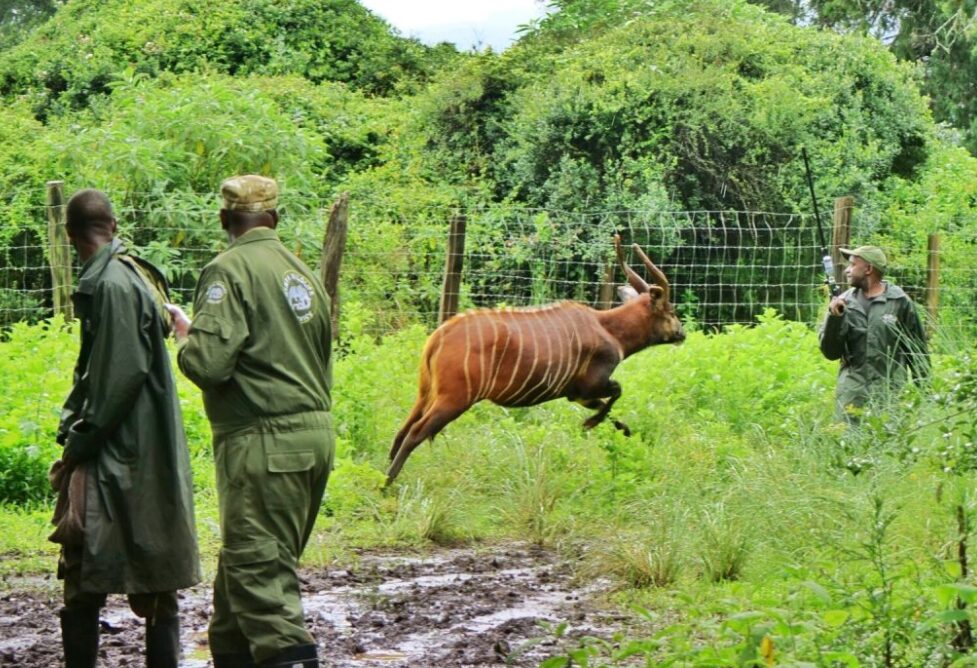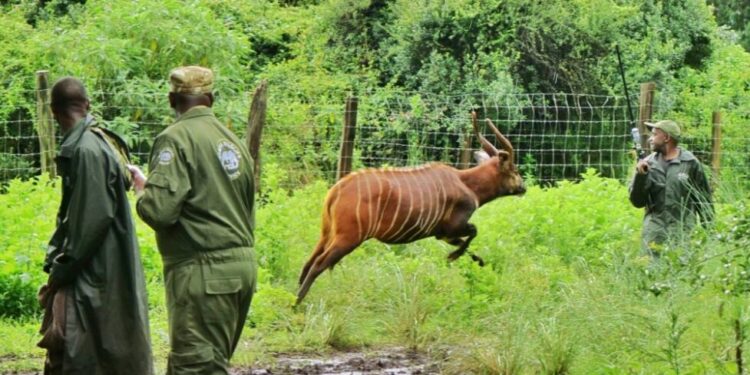The 17 bongos, which were safely transported to Kenya in late February, have reportedly adapted well to their new environment, with signs of thriving in their expansive 20-acre sanctuary.
The animals, including 12 females and 5 males, are expected to begin breeding soon, contributing to efforts aimed at increasing the population of this critically endangered species.
This repatriation follows decades of careful research and breeding by the Rare Species Conservatory Foundation (RSCF) in Florida, with the aim of restoring the bongo population in Kenya, their native homeland.
The 17 bongos are part of a broader strategy outlined in Kenya’s National Bongo Action and Recovery Plan, which seeks to bring the population to 750 over the next 50 years.
The complex logistics behind the translocation were made possible through collaborations between RSCF, Lewa Wildlife Conservancy, Tusk, DHL, and the Kenya Wildlife Service (KWS).
The bongos underwent a thorough pre-shipment process, including vaccinations for various diseases and the pioneering recombinant-DNA vaccine developed by the University of Georgia’s Infectious Diseases Laboratory.
The animals were transported on a special Mountain Bongo-branded DHL Boeing 767, which carried them from Palm Beach International Airport to Jomo Kenyatta International Airport in Kenya.
After arriving in Kenya, the bongos were then transported by road to the sanctuary, located 250 kilometers away.
The sanctuary, constructed through a partnership between Lewa Wildlife Conservancy, the Meru Bongo and Rhino Conservation Trust (MBRCT), and the Kenya Forest Service, will serve as both a breeding ground and a safe haven for the species.
Lewa Wildlife Conservancy’s Chief Executive Officer, Mike Watson, expressed great pride in the return of the mountain bongos, stating that the project represents a pivotal moment in the restoration of Kenya’s natural heritage.
“For decades, these animals have been absent from the very forests where they belong,” Watson remarked.
“This project will play a crucial role in reversing that loss and serves as a testament to the power of collective action in wildlife conservation.”
Prof. Amb. Judi Wakhungu, a board member at Lewa, emphasized the historical importance of the return of the mountain bongos. She noted that their return marks the culmination of years of international collaboration and conservation work, with the original animals having left Kenya in the 1970s.
“This is historic. The 20th generation of these bongos has now returned to their homeland,” she said, celebrating the success of the project.
Local communities in the area also stand to benefit from the project, according to John Kinoti, Chairman of the Meru Bongo and Rhino Conservation Trust.
“The favorable climate here is perfect for breeding the bongos, and their return is not just a victory for conservation but also for local communities,” Kinoti said.
He highlighted how the initiative has created jobs and contributed to the development of community projects related to education, healthcare, and local livelihoods.
As the mountain bongos settle into their new home, all involved parties remain committed to ensuring their long-term survival and to supporting further conservation efforts across Kenya’s protected areas.












